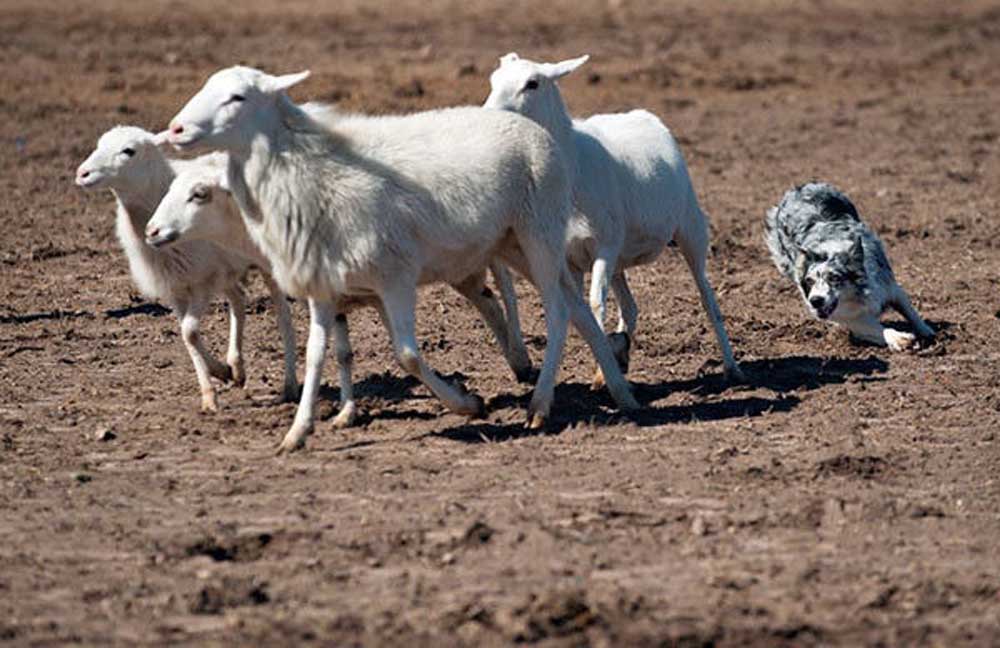Pack of border collies keep East Texas farm running
Published 11:24 am Friday, March 20, 2015

- (photo by Sarah A. Miller Tyler Morning Telegraph) A border collie named Honda from C-Horse Farms in Troup herds sheep during a herd dog demonstration at Diamond B Ranch in Neches, Texas during the 1836 Chuckwagon Races.
TROUP – Three generations of four-legged ranch hands are earning their keep on a busy family farm in Troup that’s operated exclusively by women.
Mother and daughter Carol Collins, 55, and Jessica Jones, 32, said it could be difficult, if not impossible, to keep their full-time sheep and cattle operations humming efficiently without their seven working border collies.
All parties involved appear evenly matched.
The dogs are brainy bundles of energy; their humans are tough, task-oriented and picky about their pups.
“I’ve tried other breeds, but they can’t do what border collies can do,” Ms. Collins said with a grin. “They are athletic, smart and easy to teach. … I do have to open the gate. They aren’t good at gates, yet.”
The duo is quick to sing the praises of their four-footed cow hands.
Dogs don’t fudge when it comes to working in the rain, call in sick when it’s time to vaccinate or ask for shorter work days when the fish are biting.
More importantly, the pooches are eager learners and follow directions without challenge.
This “what-can-I-do-for-you” attitude is helpful because their business, the 20-acre C-Horse Farm, provides a litany of other services in addition to livestock sales, such as equine hoof care and cross fit personal training, Ms. Jones said.
An occasional puppy is available for purchase, although the women are quick to say they are not dog breeders and prefer to keep them around to learn the ropes.
“Over the years I’ve worked a lot of shows as livestock coordinator,” said Ms. Collins. “In working the different shows, the dogs have had to learn a lot and I’ve had to learn a lot. We’re pretty efficient these days.”
For fun, the ladies occasionally enter their border collies in herding competitions, earning accolades for precision, obedience and skill.
However, leaving the farm to compete is difficult because operations chug along 24 hours a day, 365 days a year.
On a recent visit, the pair used two canines to help corral a small herd of sheep for de-worming.
The chore unfolded in an open field, without the benefit of pens and chutes.
The collies worked quickly to get the sheep into position, responding to one or two-word commands such as “look back” and “down.”
As the women grabbed the bleating sheep to dispense medication, Jones’ 5-year-old daughter, Piper, marked the treated ones with a streak of bright pink paint to avoid a repeat dose.
Border collies are natural herders, but they must be taught the basics, the farmers said.
“The sheep are aware the dogs are coming for them,” Ms. Jones said as the animals move away from the approaching canines. “There’s a lot of training involved, so the flock knows how to honor the dog.”
Likewise, the collies are trained to be gentle to avoid unnecessary harm or trauma; stubborn livestock receive a harmless nudge or light nip to get things moving.
“We love to start them on ducks, Indian runners, just so they (puppies) can know they are moving them around,” Ms. Jones said. “The puppies don’t realize it, but an older dog trails along behind.”
As the ducks move away from the larger dog, the puppy believes he or she is responsible for herding the flock.
The goal is to have a functional, confident dog that can perform efficiently in varied situations, the women said.
C-Horse Farm collies are also family pets so they get to come indoors to lounge and hang out, Ms. Collins said.
They are helpful at babysitting baby chicks and a certain giggling cowgirl in training.
“I like them,” little Piper said from atop her pony, Polka-dot.
The family said they’ve used between 15 and 20 good adult dogs over the years as ranch hands, but one stands above all the rest: Meg.
Ms. Collins discovered the flea-infested, emaciated dog tied to the front gate of her farm, suffering from a shattered rear leg and near heat exhaustion.
She took her to a vet, assuming the growling dog would not survive and reluctantly agreed to swap her farrier (equine hoof care) services for medical care.
It was the start of a lasting friendship, sort of.
“She loved me,” Ms. Collins said. “She was the most amazing working dog.”
Meg became fiercely loyal to the immediate family, but everyone else saw her other side.
“Outside the family, I was the only person she didn’t bite,” said longtime family friend Linda Bennett, a wide smile on her face.
Meg died suddenly in a 2012 farming accident and the pastures have never been the same, the farmers said.
“She was my dream dog,” Ms. Jones said. “The first time I met Meg, she looked at me, leaned over and bit me. But I swear, she was the best working dog, ever.”






